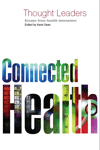 Edited by Kevin Dean
Edited by Kevin DeanOccasionally in our working lives there is an alignment of powerful forces that cause a technology, a management theory, or a new product to resonate with the broadest of audiences. The one topic that is consistently debated and the highest priority on the agenda of citizens, public servants, and nations is health - and in particular how the advent of the internet and communication technologies is changing the way we care.
This intellectually stretching collection of essays highlights the drivers for changing the way information is used to deliver better, faster, lower cost healthcare - and describes real-world experience. Patient-centric care, advances in hospital information management, the relationship with the surrounding healthcare community, and initiatives that address the strategic needs at regional, national and international levels are discussed in a format that enables both a broad view of e-health activity and specific insight into live projects. A wider perspective on e-health and its importance around the globe is identified in the preface by Dr Kazem Behbehani, Assistant Director General of the World Health Organization.
Kevin Dean, Director of European public sector Healthcare team in Cisco Internet Business Solutions Group, brings together and introduces essays from some of the leading and most influential healthcare organisations that show the range of opportunities and challenges for e-health in the 21st Century.
Download Thought Leaders: Essays from Health Innovators book (.pdf, 1.900 KB).
Download from the eHealthNews.EU Portal's mirror: Thought Leaders: Essays from Health Innovators book (.pdf, 1.900 KB).
Kazem Behbehani
Walter Bergamaschi
Martin Berlin
Kevin Dean
Peter Drury
Håkan Eriksson
Bob Gann
Pierfrancesco Ghedini
Henri-Arnauld Hansske
Reinhold Mainz
Anthony Nowlan
Sir John Pattison
Angelo Rossi-Mori
Lars Terenius